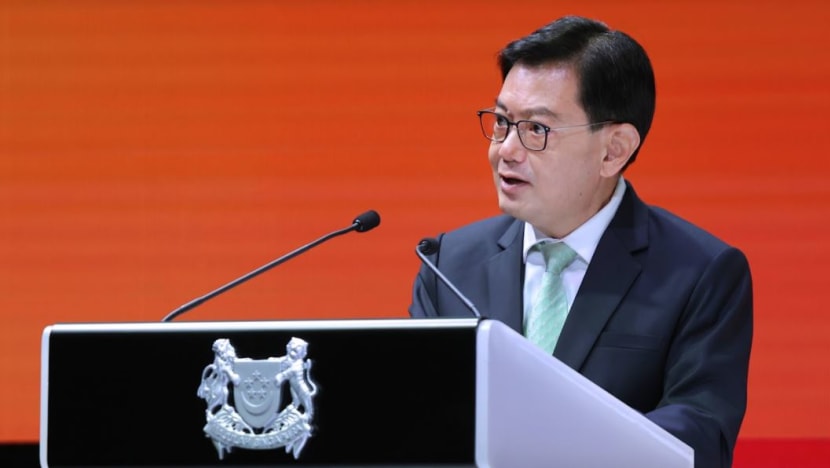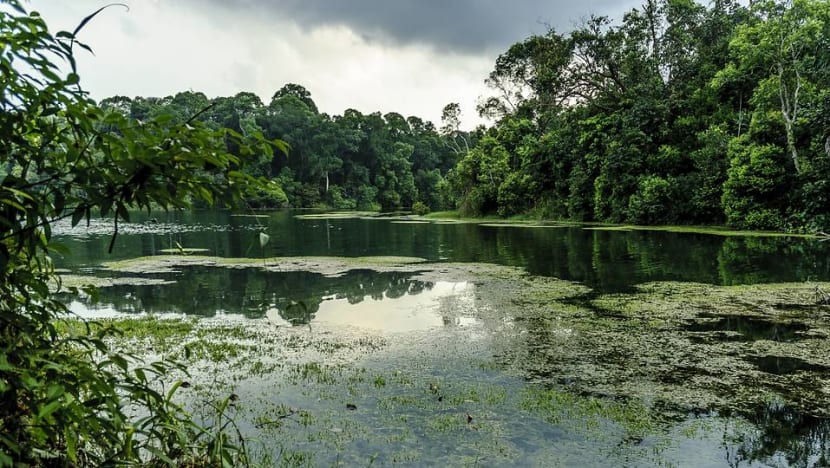Many businesses making sustainable practices a priority but commitment to change is uneven: DPM Heng

Singapore's Deputy Prime Minister Heng Swee Keat speaking at the Ecosperity Week sustainability conference on Sep 29, 2021. (Photo: Ministry of Communications and Information)
SINGAPORE: While many businesses are responding to climate change by making sustainable practices their priority, the commitment to change has been uneven, said Deputy Prime Minister Heng Swee Keat on Wednesday (Sep 29).
Despite greater consumer awareness and preference for sustainable business practices, a “significant proportion” are still not ready to pay more for such goods, noted Mr Heng, who is also the Coordinating Minister for Economic Policies.
“Some companies have found it difficult to make the shift while remaining viable, a few have resorted to 'greenwashing', which undermines genuine efforts to go green,” he added.
In his opening address at the Ecosperity Week sustainability conference, Mr Heng stressed the importance of collective action in tackling climate change.
More can also be done to achieve economic growth and improve lives, while protecting nature and its ecosystem, he said.
“What is clear is that carbon will become an increasingly greater constraint for the world, but this does not mean that global growth would be stunted, and human progress impeded,” he said.
“What we can achieve in the decades ahead, depends critically on what we do today.”
Related:
BALANCING TRADE-OFFS
In the push for a green recovery, Mr Heng said science and technological innovation can help to lower the barriers by providing more sustainable alternatives.
Pointing to the construction and maintenance of buildings, which accounts for 40 per cent of global carbon emissions, he said that Singapore is currently exploring the use of low carbon construction materials to reduce its footprint. These include mass engineered timber and low-carbon green cements.
It’s one example of how the country can balance the trade-offs from urbanisation through science and technology.
Last year, the government announced a $25 billion plan for research and innovation over the next five years to help it emerge stronger from COVID-19 and beef up its defences against future threats.
Sustainability was one of the key areas highlighted in the blueprint.
Mr Heng said the country is also pursuing other areas, such as making carbon capture and low-carbon hydrogen technologies more feasible.
Beyond science and innovation, nature can also contribute much more in the fight against climate change, he added.
"The potential for nature-based solutions in Southeast Asia is tremendous," he said.
"In addition to 200 million hectares of terrestrial forests, Southeast Asia is home to the largest blue carbon stock in the world.
"These blue carbon ecosystems – mangrove swamps, seagrass meadows, algae – can sequester large amounts of carbon."

However, unlocking this potential at scale will require a significant amount of investments, he said.
To catalyse the flow of capital, Mr Heng said a carbon marketplace must be built with robust governance standards and an emphasis on trust.
“The work required ranges from developing compatible definitions and taxonomies for nature-based solutions, to implementing a consistent set of global standards for disclosures and reporting,” he said.
“If properly structured, investment in nature can be a new asset class, not different from investment in agriculture and crops,” he added.
Earlier this year, plans for a new global carbon exchange and marketplace that would provide organisations with “high-quality carbon credits to address hard-to-abate emissions" were unveiled.
Called Climate Impact X, the joint venture by DBS Bank, Singapore Exchange, Standard Chartered and Temasek will be headquartered in Singapore.
Mr Heng said it will be launched in the coming months.
“This is a promising solution in the fragmented carbon credit markets landscape today, which is characterised by thin liquidity and carbon credits of varying quality,” he said.
“I hope that this new marketplace will catalyse more nature-based and other solutions in the region.”
















